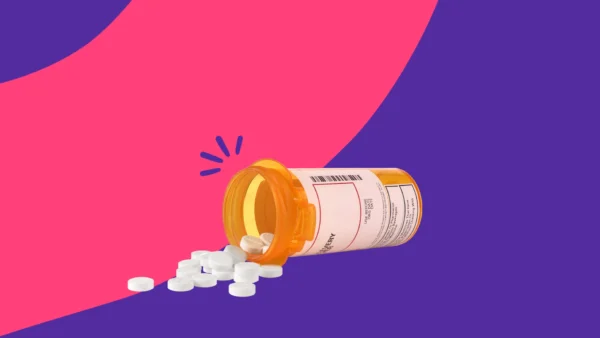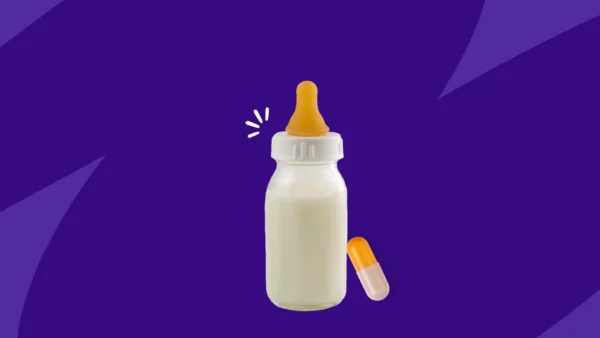Key takeaways
There’s no major interaction between benzonatate and the original NyQuil Cold & Flu.
You should space out the doses to avoid the risk of increased side effects from combining the medications—namely, drowsiness.
Consult a healthcare provider before taking these medications together if you are younger than 18, taking steroids, pregnant or breastfeeding, or have an underlying health condition.
You’ve heard that mixing medications can be dangerous. But when you have a nagging cough that’s keeping you up all night, it can be tempting to try a second treatment if the first doesn’t work. NyQuil, which contains acetaminophen, dextromethorphan, and doxylamine, is a popular over-the-counter (OTC) cough medicine and cold remedy that you probably already have in your medicine cabinet. It has many benefits, including relieving stuffy nose, fever, cough, and other cold symptoms. Benzonatate is a prescription cough suppressant, also sold under the brand name Tessalon Perles, that works by desensitizing receptors in the lungs and reducing the urge to cough. They’re both used to alleviate symptoms of bronchitis and the common cold. But is taking benzonatate and NyQuil together the perfect cocktail to cure what ails you or a recipe for disaster? Good news: Taking benzonatate with NyQuil is generally safe. However, use caution. Taking these two medications together can intensify drowsiness—a main side effect of both drugs—which could affect your coordination and ability to do things that require alertness, like driving.
Can you take benzonatate with NyQuil?
Yes, you can take benzonatate with NyQuil if recommended by your healthcare provider. However, they should not be taken at the exact same time. Although there are several kinds of NyQuil, there is no interaction between benzonatate and the original Nyquil formulation (which includes the pain reliever acetaminophen, the cough suppressant dextromethorphan, and the antihistamine doxylamine succinate). However, you should space out the doses to avoid the risk of increased side effects from combining the medications.
“The safest duration is 5 hours between the two since benzonatate will be removed from one’s body by then,” says Benjamin Gibson, a clinical pharmacist and professor in San Antonio, Texas. For example, since the medications can cause drowsiness—and Nyquil is marketed to help you sleep—you could take Nyquil at night and benzonatate in the morning.
How much benzonatate and NyQuil can you take together?
If you’re taking benzonatate and NyQuil, it’s crucial to take the correct prescribed dose of both medications. Follow the dosing instructions on the labels, and don’t hesitate to talk to a healthcare provider or pharmacist if you have questions.
A typical prescription dosage of benzonatate for adults is 100 mg to 200 mg, three times daily. Different types of NyQuil may include different dosing instructions. For the original NyQuil Cold & Flu, anyone 12 years and older can take 30 mL every six hours as long as you don’t exceed 120 mL in a 24-hour period.
When in doubt, opt for the lowest dose and see how you feel. “As a rule, lower doses are preferred initially, especially for patients of smaller size and kids, with gradual dialing-up as needed,” says J. Wes Ulm, MD, a physician-researcher and bioinformatics specialist in Bethesda, Maryland.
Use caution when combining these medications if you are younger than 18 years of age, taking steroids, or have an underlying health condition. That includes people with breathing problems, diabetes, glaucoma, heart problems, high blood pressure, kidney problems, liver disease, seizures, or stomach problems that ingredients in the medications could worsen. If you’re pregnant, breastfeeding, or taking other medications like acetaminophen or antihistamines, seek medical advice before combining these medications.
Side effects of benzonatate and NyQuil
Combining medications like benzonatate and NyQuil can cause additive side effects. In other words, it intensifies the side effects of both medications. Notable adverse effects of benzonatate and NyQuil include mild side effects, such as:
- Enhanced drowsiness
- Difficulty concentrating
- Dizziness
- Gastrointestinal discomfort
Rare but more serious side effects include:
- Visual hallucinations
- Confusion
- Allergic reactions, such as a skin rash
If you experience any of these reactions when taking benzonatate and NyQuil, seek immediate medical attention.
When to take benzonatate and NyQuil together
The severity of your symptoms may warrant taking both medications. “Benzonatate and NyQuil have a synergistic effect in their suppression of one’s predilection to cough,” says Dr. Ulm. That means they are more effective at stopping a nagging cough when taken together than apart. Additionally, NyQuil has other therapeutic benefits, such as reducing fever or aches and pains. If you are up all night hacking and coughing, it could be a good idea to combine these medications so you can get the rest you need to feel better.
“As a rule, it’s best to minimize their use in the presence of a productive cough that is helping to remove secretions and mucus amid an active infection. But they can be helpful, particularly for the kind of dry, persistent, hacking cough that often sticks around even long after the infection is cleared,” says Dr. Ulm. Or, if you have multiple symptoms, the combination of these two medications may be worth the potential risk of additional side effects. However, you should seek advice from your healthcare provider or pharmacist prior to taking both medications.
Sources
- Tessalon, FDA (2010)
- Vicks NyQuil Severe Cold and Flu, DailyMed (2023)
- Benzonatate, ScienceDirect (2012)
- Treatment of the common cold, Journal of the Medical Association of Thailand (2003)
- Dextromethorphan in cough syrup: The poor man’s psychosis, Psychopharmacology Bulletin (2017)











